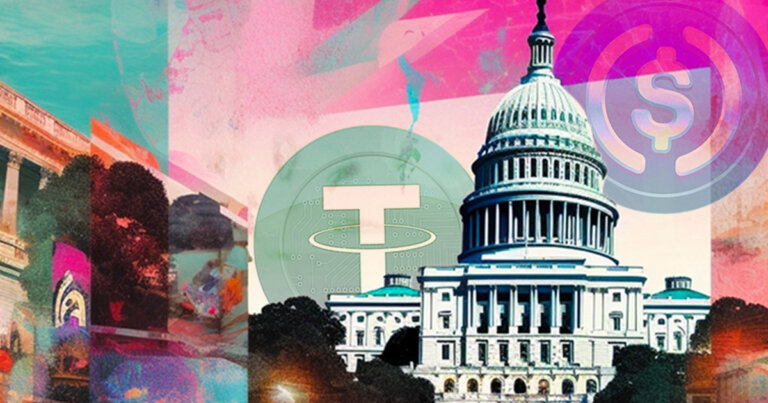 Highlights from Financial Service Committee hearing on stablecoins
Highlights from Financial Service Committee hearing on stablecoins Highlights from Financial Service Committee hearing on stablecoins
Lawmakers said they want to support stablecoins as a recognized payment method - however, the committee hearing highlighted a huge gap in lawmakers' understanding of the technology.

Cover art/illustration via CryptoSlate. Image includes combined content which may include AI-generated content.
The Digital Assets Financial Technology Inclusion Committee held a hearing on May 18 to discuss stablecoin policy.
In opening the meeting, Congressman French Hill said it is the committee’s aim to put through legislation supporting stablecoins as a recognized payment method.
“We want for payment stablecoins to be used as a payment mechanism, which they’re really not today. The only way we can do that is by passing the appropriate regulatory framework”
Touching on the issue of anti-crypto sentiment at the governmental level, Congressman Hill clarified that committee members have the power to reverse the trend of U.S. crypto flight and “submit the U.S. as the leading place for safe payments innovation.”
“I look forward to our witnesses’ views on the two proposals and ultimately bring legal clarity and consumer protection to the stablecoin ecosystem.”
Finding bipartisan agreement on stablecoin regulation
In building on the previous stablecoin hearing that took place in September 2022, both parties submitted revised proposals addressing key points with a view to finding alignment on approving appropriate stablecoin regulation.
Some of the key points of concern include the speculative nature of stablecoins, which are primarily used for trading against cryptocurrencies, structural fragilities making them susceptible to runs, the roles of state versus federal regulators, the outcome of non-bank companies issuing stablecoins, how disclosures and attestations would operate, the role of the Fed, and safeguarding against threats to economic stability.
In addressing these concerns, witness testimonies were heard from Fennie Wang, the founder of Humanity Cash, Matt Homer, Managing Member, The Department of XYZ and former Executive Deputy Superintendent of Research and Innovation at the New York Department of Financial Services (NYDFS), David Portilla, Partner at Davis Polk & Wardwell, Robert Morgan, the CEO of USDF Consortium, and Delicia Reynolds Hand, Director of Financial Fairness.
This was followed by witness questioning from committee members to address the concerns raised.
Q&A highlights
Congressman Lynch made a point that if stablecoin regulation was given to individual states to decide, they would be encouraged to ratify lax regulation to attract stablecoin issuers to their jurisdiction – hence triggering a downward spiral of regulatory leniency among competing states.
It was noted that Congressman Lynch did not know the difference between cryptocurrencies and stablecoins – as evidenced when asking Mr. Homer the number of stablecoins registered and approved in New York State.
Congressman Lynch said a ratio of five approved stablecoins in New York out of twenty thousand is evidence of an impending “race to the bottom.” Mr. Homer did not correct the Congressman.
With regard to stablecoins and securities status, Congressman Bryan Steil mentioned the recent SEC Wells Notice served against Paxos – in which the securities regulator alleged the company had issued an unregistered security in the Binance USD stablecoin.
Congressman Steil asked Mr. Homer for his opinion on the matter, to which he replied the Howey Test was incorrectly applied in this case as it’s hard to understand how a stablecoin user has an expectation of profit.
Discussing the Fed’s role in stablecoin oversight, Congresswoman Maxine Waters put it to Mrs. Hand that top-down legislation, with the federal level at the top, would ensure better consumer protections.
Mrs. Hand agreed that the role of federal agencies at the top is key for consumer protection. She stated that the Fed could operate stablecoin oversight the same way as it governs chartered banks.
“There has to be a role for the Fed to review applications and reject them if they don’t meet certain requirements.”





























































































